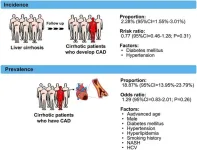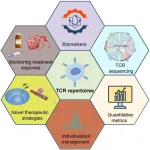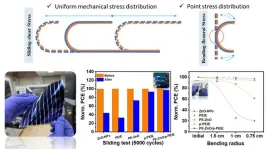(Press-News.org) MIAMI, FLORIDA (EMBARGOED UNTIL Dec. 10, 2024, AT 10AM EST) – New research from Sylvester Comprehensive Cancer Center at the University of Miami Miller School of Medicine suggests that one’s biological age, which can be higher than his or her chronological age – a concept called accelerated aging – may predict who’s at risk for developing colon polyps, a known risk factor for colorectal cancer.
The findings, published in Cancer Prevention Research, a journal of the American Association for Cancer Research, link accelerated aging to increased early colorectal cancer risk and indicate that those aging faster than their actual age – accelerated agers – may benefit from early colon-cancer screening. Early detection has been shown to improve both treatment options and outcomes for this disease.
Unlike chronological age, which simply counts years lived, biological age is based on physiological markers that reflect the impact of genetics, lifestyle choices and environmental factors. It’s determined through sophisticated DNA analysis.
“Biological age is an interesting concept, and it leads to the idea of accelerated aging, when your biological age exceeds your chronological age,” explained Shria Kumar, MD, a colorectal cancer researcher at Sylvester and the study’s senior and corresponding author. For example, she added, if someone is 50, but his or her biological age is 55, that’s five years of accelerated aging that might be reflected in overall body functioning.
“It sounds pretty theoretical, but actually accelerated aging has been shown to be predictive of time to death and even of multiple cancers,” Kumar continued, noting that this line of research adds to a growing area of study within epigenetics, which examines the mechanisms behind deteriorating cell functions.”
Rising Rates in Younger People
Colorectal cancer rates in people under 50, called early-onset colorectal cancer, have been rising. Since 2011, these rates have been increasing by 2% a year in people younger than 50, according to the American Cancer Society.
Accordingly, researchers have been striving to determine the best age to begin screening for colorectal cancer. The U.S. Preventive Services Task Force has lowered its recommended starting age from 50 to 45.
However, this change might not be sufficient to fully address the problem, Kumar noted, because half of early-onset colorectal cancers occur in people under 45, according to the latest statistics from the National Cancer Institute.
Screening Methods
There are several ways to screen for colon cancer now, including more convenient stool-sample tests collected at home. But colonoscopy, a more invasive outpatient procedure that requires sedation in a medical facility, remains the gold standard.
During a colonoscopy, the doctor can identify and remove polyps, which are soft-tissue growths that can lead to cancer. Polyps are common, affecting about 20% to 30% of adults, and removing them during colonoscopy can prevent colon cancer.
“What’s really, I think, exciting about the opportunity in colorectal cancer is that we have a clear prevention tactic,” Kumar said. “Colonoscopy is not only early detection, but also cancer prevention.”
Analyzing Biological Age
Some factors that raise a person’s risk of early-onset colorectal cancer also elevate biological age. These include obesity, smoking, alcohol consumption and other lifestyle habits.
For this study, Kumar and Sylvester colleagues Chloe Brown and Maria Yow investigated biological age as a risk factor for colorectal cancer by studying people under 50 who were having colonoscopies. The team assessed patients’ biological age through extensive DNA analysis of blood samples and compared it with their colonoscopy results.
They discovered that each year of accelerated aging correlated with a 16% increased risk of developing polyps. Interestingly, the study did not link other factors, such as body-mass index and smoking history, to polyp risk. But it did find that gender was the strongest risk factor for polyps.
“While I think the biological age finding is interesting and, maybe, exciting, the strongest risk factor for having a pre-cancerous polyp remains male sex,” Kumar explained. “While we continue to look at biological age and other risks, we also need to evaluate why sex is such a differential risk factor.”
Key Takeaways
The authors believe risk-based screening for colorectal cancer focused on people with accelerated aging could yield beneficial results. “If we can develop a practical model to really identify and target higher risk people and put them through colonoscopy, we can prevent their cancers,” Kumar explained.
She noted that her team will need to conduct more research with larger sample sizes to obtain a clearer picture. “Aging is multifaceted, and we need larger studies to establish whether most people’s biological age is the same as their chronological age,” she said. “It is pretty striking that multiple studies, including ours, have found that biological age provides distinct health information and that could help us prevent cancer.”
about Sylvester research on the InventUM Blog and follow @SylvesterCancer on X for the latest news on its research and care.
# # #
Authors: Chloe M. Brown and Maria V. Yow, Sylvester Comprehensive Cancer Center, University of Miami Miller School of Medicine; and Shria Kumar, MD, Sylvester Comprehensive Cancer Center, Division of Digestive Health and Liver Diseases, University of Miami Miller School of Medicine.
END
The National Academy of Inventors (NAI) announced today the election of 170 exceptional inventors into the 2024 Class of Fellows. NAI Fellowship is the highest professional distinction awarded solely to inventors. The full list of 2024 Fellows can be found here.
The 2024 cohort of Fellows exemplifies the Academy’s belief that groundbreaking innovation knows no bounds and inventors can be found everywhere. This is evident in the fact that the honorees represent 39 U.S. states, 12 countries, and 43% identify as underrepresented ...
SAN ANTONIO — December 10, 2024 — Southwest Research Institute successfully customized and conducted a full-scale evaluation of a novel fire mitigation method designed to safely store damaged electric vehicles and batteries. SwRI engineers demonstrate customized research and development support for government and industry clients with novel projects and challenges related to emerging technologies where no standardized testing exists.
“SwRI established the nation’s first fire-focused research program 75 years ago, so our extensive ...
INDIANAPOLIS – Family members of intensive care unit (ICU) patients often experience psychological and spiritual distress as they deal with serious illness and potential death. A new paper authored by a national team of experts at the intersection of health and spirituality highlights the critical role of the spiritual care provided by chaplains in supporting family members of ICU patients.
Chaplains have extensive training, learning to address diverse spiritual as well as religious concerns that have been shown to affect medical decision making. This enables them to support the decision-making ...
During economic, political, or other crises, non-governmental organisations (NGOs) often experience a heightened need for their support and assistance. Yet, the recent global crisis of the COVID-19 pandemic presented unexpected challenges to the NGOs: restrictions on movement imposed by governments prevented them from carrying out their activities and providing certain services. Moreover, despite the increase in demand for NGO services, organisations have faced the problem of raising funding, as some of the usual methods of fundraising have ...
WASHINGTON—Early life exposure to a class of endocrine-disrupting chemicals (EDCs) called polychlorinated biphenyls (PCBs) may lead to behavioral problems in rats, according to a new animal study published in the Journal of the Endocrine Society.
Endocrine-disrupting chemicals (EDCs) are chemicals that mimic, block or interfere with hormones in the body's endocrine system and contribute to endocrine diseases such as cancer, reproductive disorders, obesity and neuroendocrine disorders.
PCBs have been banned for decades but are still persistent in ...
Researchers have found that the global goal of limiting warming to 1.5 degrees Celsius above pre-industrial levels is now almost certainly out of reach.
The results, published Dec. 10 in Geophysical Research Letters, suggest the hottest years ahead will very likely shatter existing heat records. There is a 50% chance, the authors reported, that global warming will breach 2 degrees Celsius even if humanity meets current goals of rapidly reducing greenhouse gas emissions to net-zero by the 2050s.
A number of previous studies, including the authoritative ...
Background and Aims
Coronary artery disease (CAD) is increasingly observed in patients with liver cirrhosis. However, data on the incidence and prevalence of CAD in cirrhotic patients are heterogeneous, and the association remains uncertain. In this study, we aimed to conduct a systematic review and meta-analysis to address these issues.
Methods
PubMed, EMBASE, and Cochrane Library databases were searched. Incidence, prevalence, and factors associated with CAD were pooled using a random-effects model. Risk ratio (RR) and odds ratio (OR), with their ...
All living organisms host microbiomes composed of both beneficial and harmful microbes that influence health. Microbiome diversity affects host fitness: low diversity can lead to immune issues and poor nutrient absorption, while high diversity can boost resilience to stress and pathogens.
To illuminate this issue, researchers from Florida Atlantic University’s Charles E. Schmidt College of Science, have spent the last five years studying the relationships between songbird gut microbiomes and traits that relate to a bird’s health and breeding success. While links between the gut microbiome and other traits have been described in laboratory experiments with captive animals, ...
Hepatocellular carcinoma (HCC) stands as the dominant form of liver cancer, ranking as the fourth leading cause of cancer-related deaths globally. Often diagnosed at advanced stages, the therapeutic landscape is limited, with transarterial chemoembolization (TACE) serving as a key locoregional treatment. TACE, while effective in inducing tumor necrosis, exerts dual effects on the tumor microenvironment (TME), necessitating integration with systemic therapies like immune checkpoint inhibitors (ICIs). Yet, therapeutic resistance, hypoxia-induced angiogenesis, and immune evasion remain significant barriers. The advent of T-cell receptor (TCR) sequencing offers a transformative lens to ...
The Korea Institute of Materials Science (KIMS) announced that a research team led by Dr. Dong-Chan Lim and Dr. So-Yeon Kim from the Energy & Environment Materials Research Division has developed a next-generation thin-film material technology that significantly improves the durability of energy and electronic devices. This technology, which combines organic and inorganic materials in a dual-layer structure, can be applied to film-based solar cells and sensors. It is particularly notable for its ability to minimize the physical stress caused by rolling or unrolling, thereby greatly enhancing mechanical ...







